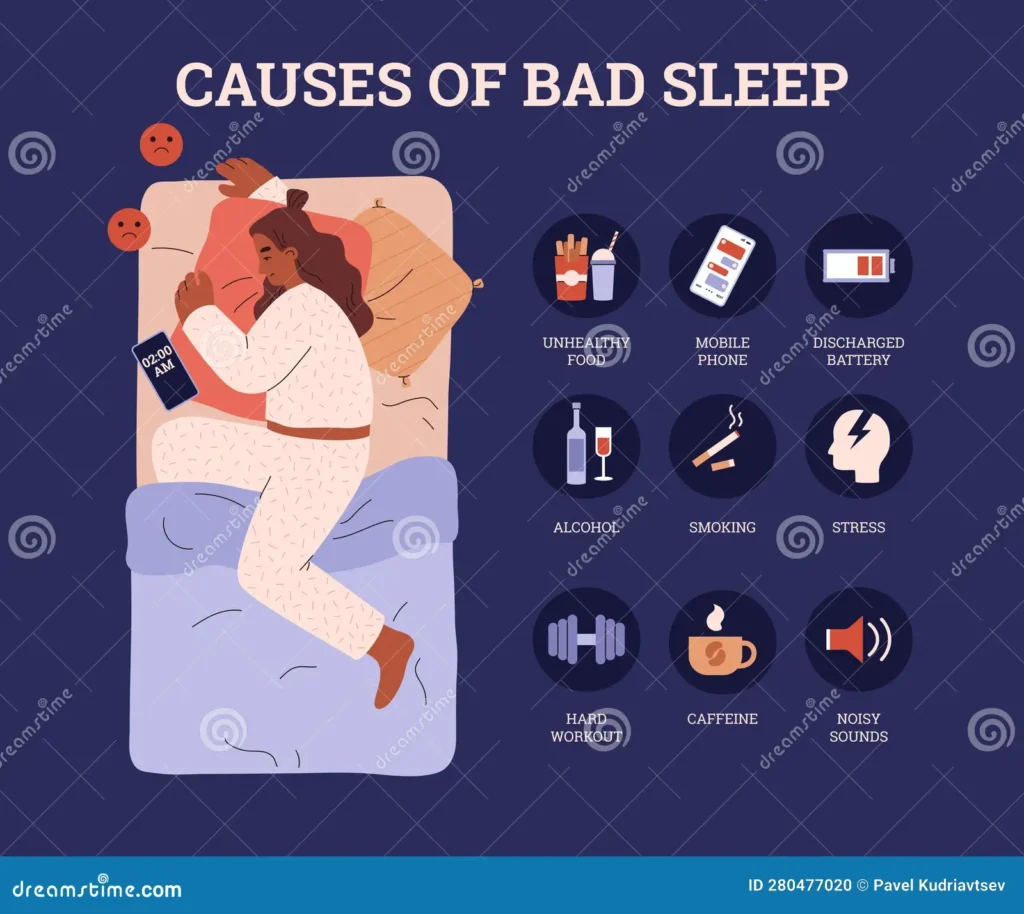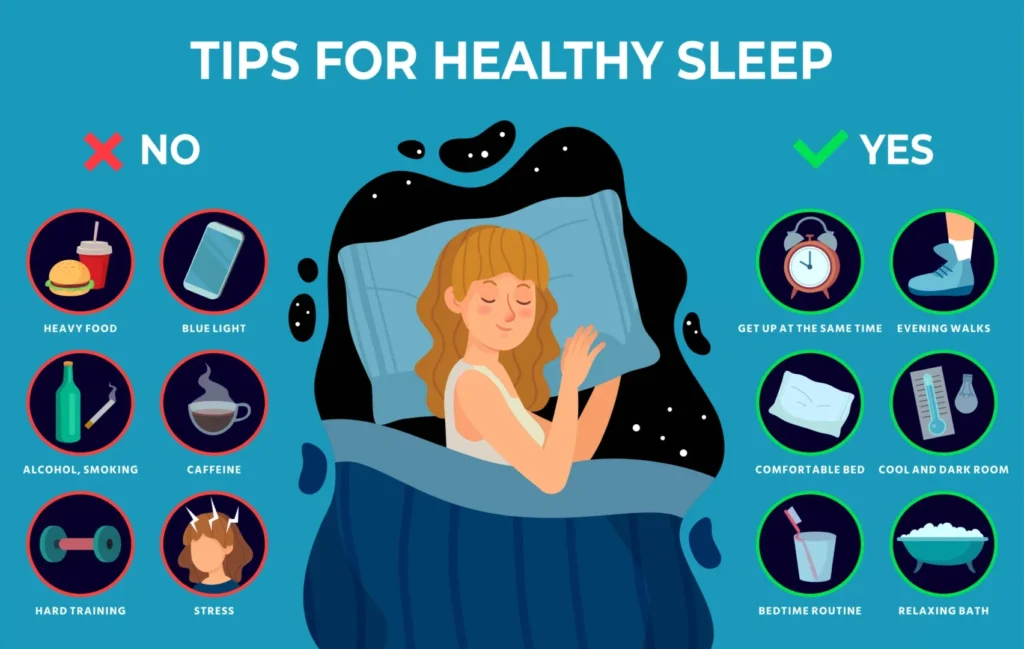Sleep is a biological necessity. It impacts nearly every system in the body, including the brain, heart, lungs, metabolism, and immune function. Yet, millions of people struggle with poor sleep, often without understanding the reasons why. This comprehensive article explores the science behind sleep and offers practical, evidence-based strategies to improve it.

Understanding Sleep and Its Stages
What Happens When You Sleep
Sleep isn’t just a passive state of rest. It’s a dynamic process involving cycles of brain activity. During sleep, the body repairs itself, consolidates memories, and regulates various physiological processes.
The Sleep Cycle
Each night, the body moves through several sleep cycles. Each cycle lasts around 90 minutes and includes:
- Non-REM Sleep: This stage includes light sleep (Stage 1), intermediate sleep (Stage 2), and deep sleep (Stage 3). Deep sleep is crucial for physical restoration.
- REM Sleep: Rapid Eye Movement sleep is when most dreaming occurs. It’s essential for cognitive functions like memory and learning.
These stages repeat throughout the night, and a balance of both is necessary for optimal health.
The Importance of Sleep
Physical Health Benefits
Adequate sleep supports heart health, weight regulation, and immune function. Chronic sleep deprivation increases the risk of hypertension, diabetes, stroke, and cardiovascular disease.
Cognitive and Emotional Health
Sleep improves concentration, decision-making, and creativity. It also helps regulate emotions. Lack of sleep is linked to anxiety, depression, and irritability.
Hormonal Regulation
Sleep influences hormones that control hunger (ghrelin and leptin), stress (cortisol), and growth (growth hormone). Disrupted sleep patterns can upset this delicate hormonal balance.
Causes of Poor Sleep
Lifestyle Factors
Irregular sleep schedules, late-night screen use, and consumption of caffeine or alcohol can disrupt the natural sleep cycle. Shift work and frequent travel also interfere with circadian rhythms.
Environmental Disruptions
Noise, light, and uncomfortable temperatures can make it difficult to fall or stay asleep. Even small distractions can fragment sleep cycles and reduce sleep quality.
Psychological Conditions
Stress, anxiety, and depression often interfere with sleep. Racing thoughts and emotional turmoil make it harder to relax and enter deep sleep stages.
Medical Issues
Sleep disorders like insomnia, sleep apnea, restless legs syndrome, and narcolepsy can significantly impact sleep quality and duration. Consulting a healthcare provider is essential for diagnosis and treatment.

How to Improve Sleep Quality
Establish a Consistent Sleep Schedule
Going to bed and waking up at the same time every day reinforces your body’s natural sleep-wake cycle. Consistency improves sleep quality over time.
Create a Restful Environment
A dark, quiet, and cool room promotes better sleep. Blackout curtains, white noise machines, and temperature control can make a big difference.
Limit Exposure to Screens Before Bed
Blue light emitted by phones, tablets, and computers suppresses melatonin production. Reducing screen time at least an hour before bed supports the body’s natural sleep signals.
Be Mindful of Food and Drink
Avoid heavy meals, caffeine, and alcohol before bedtime. These substances can disrupt the sleep cycle and decrease overall sleep quality.
Exercise Regularly
Physical activity helps you fall asleep faster and enhances sleep depth. However, avoid vigorous exercise close to bedtime as it may be stimulating.
Practice Relaxation Techniques
Mindfulness, meditation, and deep breathing exercises calm the mind and body. These techniques can prepare you for sleep by reducing stress levels.
Consider Cognitive Behavioral Therapy for Insomnia (CBT-I)
CBT-I is a structured, evidence-based approach to treating chronic insomnia. It addresses the thoughts and behaviors that contribute to sleep problems and is often more effective than medication.
Sleep Hygiene: Daily Habits for Better Sleep
Set a Bedtime Ritual
A calming pre-sleep routine signals your brain that it’s time to wind down. Reading, listening to soothing music, or taking a warm bath can ease the transition into sleep.
Use Your Bed Only for Sleep and Intimacy
Avoid working or watching TV in bed. This helps strengthen the association between bed and sleep.
Get Morning Sunlight
Exposure to natural light in the morning boosts alertness and sets your internal clock. This helps regulate your circadian rhythm.
Avoid Long Naps During the Day
If you need to nap, keep it short—20 to 30 minutes. Long naps can interfere with nighttime sleep.

The Role of Technology in Sleep Improvement
Sleep Tracking Devices
Wearable trackers and smartphone apps can monitor your sleep patterns. They offer insights into sleep stages, duration, and quality. Use the data to identify areas for improvement.
Smart Home Integrations
Smart lights and thermostats can be programmed to mimic natural sleep cues. Dimming lights in the evening or lowering the room temperature at night encourages better sleep.
Blue Light Filters
Many devices now offer blue light filters or night modes. These features reduce melatonin disruption and make screen time less harmful to your sleep.
Nutrition and Sleep
Foods That Promote Sleep
Certain nutrients support better sleep. These include:
- Magnesium: Found in nuts, seeds, and leafy greens. It helps regulate neurotransmitters.
- Tryptophan: An amino acid in turkey, eggs, and dairy that promotes serotonin production.
- Melatonin-rich foods: Tart cherries and grapes naturally boost melatonin levels.
What to Avoid
Spicy foods, sugar, and large meals before bed can cause indigestion and disrupt sleep. It’s best to eat a light dinner several hours before going to sleep.
Sleep Across the Lifespan
Children and Teenagers
Young people need more sleep due to rapid physical and mental development. Teenagers, in particular, require 8–10 hours per night. However, social pressures and screen time often lead to sleep deficits.
Adults
Most adults need 7–9 hours of sleep per night. Work stress, family responsibilities, and lifestyle choices frequently interfere with achieving this target.
Older Adults
Sleep patterns change with age. Older adults may experience lighter sleep and more frequent awakenings. Creating a sleep-friendly environment and maintaining a routine can help mitigate these issues.
The Future of Sleep Science
Advances in Sleep Research
Ongoing studies continue to uncover the complexities of sleep. Researchers are exploring the links between sleep and chronic diseases, brain health, and even longevity.
Personalized Sleep Solutions
With the help of AI and genetic testing, personalized sleep interventions are becoming more accessible. These solutions tailor advice based on individual sleep patterns, lifestyle, and health data.
Public Health Initiatives
Governments and health organizations are recognizing the importance of sleep. Public health campaigns aim to raise awareness about sleep hygiene and the dangers of sleep deprivation.
Final Thoughts
Improving your sleep is one of the most effective ways to enhance your physical and mental well-being. By understanding the science of sleep and implementing evidence-based strategies, you can transform your nights and wake up feeling refreshed and energized. Start small, stay consistent, and remember—quality sleep is not a luxury. It’s a foundation for a healthier, happier life.
